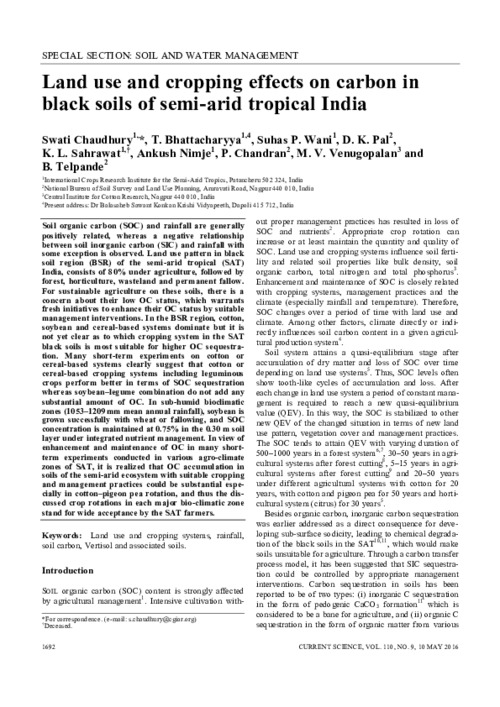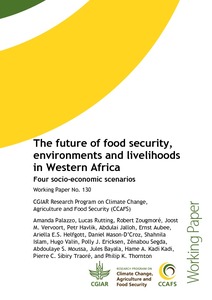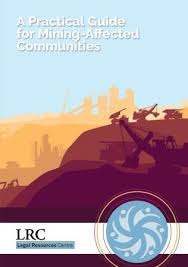Economic Boom or Ecologic Doom?
The natural endowment of the Democrat Republic of Congo, in the form of land, minerals, and forests, is unparalleled. The right mix of policies has the potential to unleash incentives that could transform the economy. However, transport infrastructure in the DRC is amongst the sparsest and most dilapidated in the world, and this lack of infrastructure is likely a significant constraint to growth.
Land use and cropping effects on carbon in black soils of semi-arid tropical India
Soil organic carbon (SOC) and rainfall are generally
positively related, whereas a negative relationship
between soil inorganic carbon (SIC) and rainfall with
some exception is observed. Land use pattern in black
soil region (BSR) of the semi-arid tropical (SAT)
India, consists of 80% under agriculture, followed by
forest, horticulture, wasteland and permanent fallow.
For sustainable agriculture on these soils, there is a
concern about their low OC status, which warrants
fresh initiatives to enhance their OC status by suitable
The future of food security, environments and livelihoods in Western Africa: Four socio-economic scenarios
This working paper examines the development of regional socioeconomic scenarios for West Africa’s development, agriculture, food security and climate impacts. We present four globally consistent regional scenarios framed and outlined by regional experts who crafted narratives and determined key drivers of change. Stakeholders identified the type of actors driving change and the timeline of strategic planning as the most uncertain and most relevant factors of change affecting food security, livelihoods and environments in the region.
Co-Benefits of Disaster Risk Management
Many ex ante measures taken to reduce
disaster risk can deliver co-benefits that are not dependent
on disasters occurring. In fact, building resilience to
climate extremes and disasters can achieve multiple
objectives. These are secondary to the main objective of
disaster risk management of avoiding disaster losses, but
identifying and measuring additional co-benefits can enhance
the attractiveness of disaster risk management investments.
The Role of Regulation on Entry
This paper studies the effects of
differences in local administrative burdens in Italy in the
years 2005–2007 preceding a major reform that sped up firm
registration procedures. Combining regulatory data from a
survey on Italian provinces before the reform (costs and
time to start a business) with industry-level entry rates of
limited liability firms, it explores the effects of
regulatory barriers on the average of the annual entry rates
À l'écoute de la relève agricole - Le vécu et les attentes des jeunes agriculteurs québécois
Source: Mapaq
En février 2015, le ministre Pierre Paradis confiait à Jean Pronovost, sous-ministre à la retraite et membre de plusieurs conseils d’administration d’institutions importantes des secteurs économique et culturel, la tâche de mener cette étude et de formuler des recommandations.
Remarks at the Opening Press Conference at World Bank/IMF Spring Meetings, Washington, D.C., April 14, 2011
Robert B. Zoellick, World Bank Group President, addresses the
biggest threat to the poor around the world: high and
volatile food prices. The Bank released an updated Food Price Watch
that underscores the need for the G20 to put food
first. The key driver behind the upward spiral in the food
price index has been sharp rises in the prices of wheat,
maize, sugar, and oils. He discusses the global food
price hikes which have pushed about 44 million people into
La Tierra: Un recurso en disputa. Institutciones, actores y procesos en Argentina, Colombia, Perú y Venezuela
La tierra: un recurso en disputa describe de qué forma y sobre qué instituciones y actores ejercen presión las actuales demandas por la tierra y otros recursos naturales asociados en los 4 países estudiados. Se identifica y se presenta a los actores que ocupan o tienen intereses en el territorio rural, haciéndose el esfuerzo de ir más allá de las categorías genéricas de “campesino”, “indígena”, “agricultor” o “inversionista”. Así, se hace un intento por desglosar y averiguar quiénes integran cada uno de estos grupos en la actualidad.
Investments in the Agricultural Value Chain: Expanding the Scope of Environment and Social Due Diligence - Improving Risk management, Creating Value and Achieving Broader Development Outcomes
This report provides guidance for development finance institutions and investors seeking to understand and manage environmental and social issues responsibly at different stages of the value chain. It provides
• information on ways investors can expand the scope of due diligence to further improve E&S risk management and drive value through supply chains,
• initial and practical information about the links between upstream and downstream actors in the value chain, including primary producers and project-affected communities, and
South–South Cooperation, Agribusiness, and African Agricultural Development: Brazil and China in Ghana and Mozambique
The rise of new powers in development has generated much debate on the extent to which South–South Cooperation (SSC) constitutes a new paradigm of development more relevant to African needs or a disguise for a new form of imperialism. This paper critically examines the rise of Chinese and Brazilian technical and economic cooperation in African agriculture with two cases drawn from Ghana and Mozambique.
A Practical Guide for Mining-Affected Communities
This guide seeks to highlight the steps that concerned parties and communities can take to address the challenges that mining poses on communities. It gives communities the tools they need to understand the law that governs mining and to protect their rights. Although it focuses on South Africa, the tools proposed will be relevant for communities facing similar issues in other countries.
This resource is part of the CCSI’s Directory of Community Guidance on Agreements Relating to Agriculture or Forestry Investment.









